WhatsApp is an alternative to SMS and MMS, that works via the Internet, thus avoiding any charges that normal messages incur. What's more, it's cross platform, available for Symbian, Android, iOS and Blackberry. This means that anyone can communicate with anyone by just installing the app, unless of course, someone is using Windows Phone, which isn't supported yet!
When you first load WhatsApp, it will ask for your phone number. According to the FAQ on its website, WhatsApp uses a similar routing technology as used for traditional SMS. In the registration process, your phone will send an SMS to itself to verify the number. If you don't have SMS included in your tariff (e.g. a basic PAYG account), this will incur the normal messaging cost. It also means that you cannot use WhatsApp without a SIM card in your phone. I would have much preferred to see a username and password type authentication, and not the account linked to a phone number. This will not be an issue to most people. However, for those who have multiple phones, it means potentially exposing several numbers to their contacts, which is confusing.
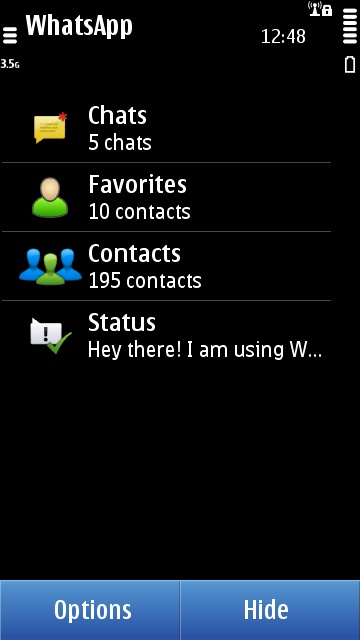
WhatsApp Messenger main menu
For those wanting control over who can contact them, WhatsApp does provide a block function. However, given that you have to share your phone number, rather than a username, the block function is rather redundant!
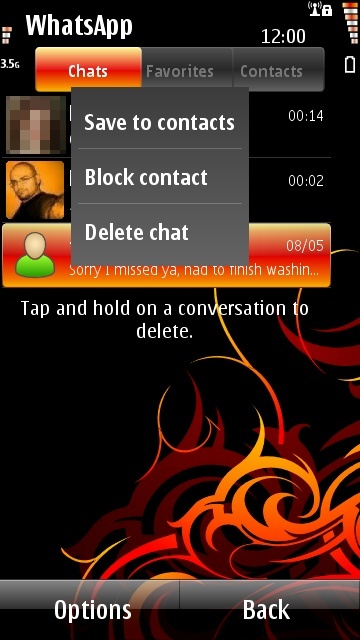
Contact management, including blocking contacts
Once registered, the app starts by presenting a menu with choices to view: saved chats, favourite contacts, all contacts, and the option to set a status message. The Chats views is exactly like the Conversations view in Symbian^3's Messaging application. The Status menu allows you to select a pre-set or custom status message that other WhatsApp users will see. This is a handy feature allowing your contacts to see whether you're busy, and how likely a speedy response may be.
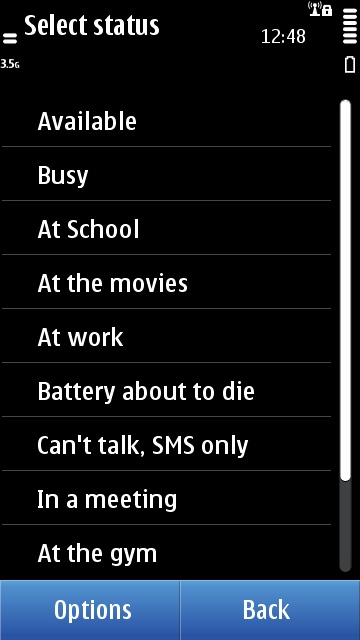
The list of provided status messages, and you can write your own
WhatsApp compares all the phone numbers saved in your Contacts application to phone numbers already registered with the service. Then any matches, i.e. people you know who already use WhatsApp, are automatically listed as favourites. I particularly liked this auto-matching feature, as it saves you having to find out who else is using WhatsApp, and allows you to start using it immediately.
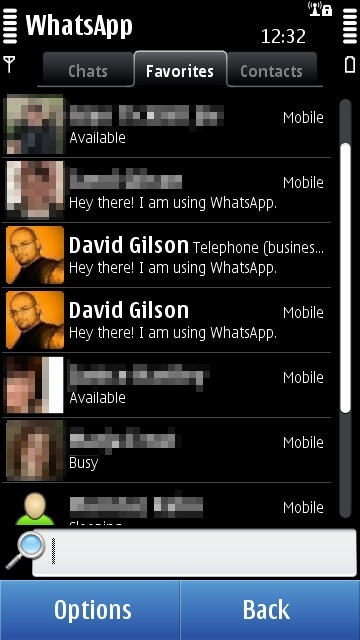
Automatically populated favourites list
The full contacts list is just a copy of your Contacts database, provided for convenience. There is an option to send an invitation SMS to anyone not using WhatsApp. Also, both from Favourites and Contacts, there is an option to initiate a phone call with any contact. WhatsApp does not route calls, it is just a link to dialling the contact in the phone application. This hints at WhatsApp aspiring to be the main communication manager on users' phones.
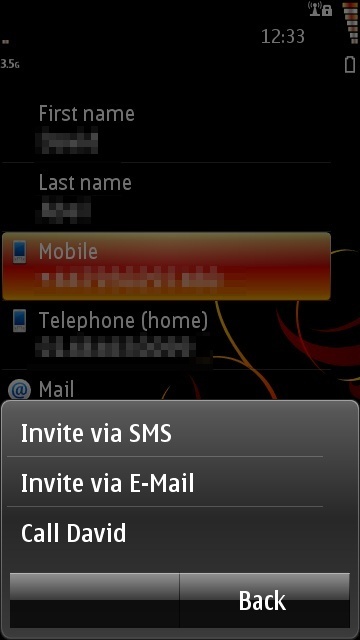
Providing an option to invite (or spam?) your friends
Returning to the chat view; messages appear in speech bubbles as with other conversation view applications. Ordinary text messages do not have any noticeable character limit. As such, there's no character counter, as you would see in an SMS application. The lack of a character limit in WhatsApp actually makes it an attractive alternative to those who use Twitter Direct Messages as an SMS alternative. Once a message has been sent, a red clock or a green tick is displayed beside the message, to indicate whether it is pending, or has been received, which is a great little reassuring feature. As most, but not all, mobile networks support a similar function for text messages.
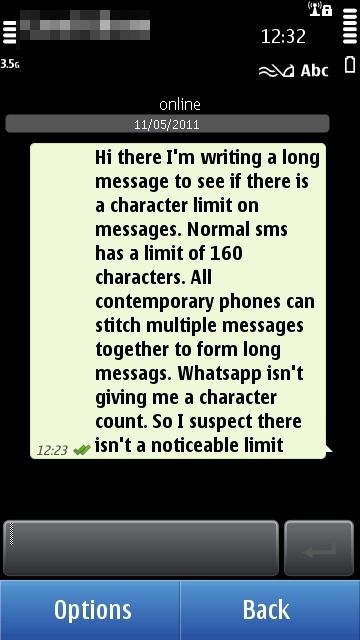
Sending a long message in WhatsApp with delivery confirmation
Once you are in engaged in a conversation, WhatsApp will inform you that the other person is typing a message. This feature subtly makes WhatsApp feel like an instant messaging application. Given that it's routing short messages via the Internet, that's exactly what it is. However, messages sent to an offline user are queued for delivery for when they come back online. Therefore, WhatsApp is good at both real time and non-real time messaging.
In addition to text, all manner of rich content can be shared too. Images, videos, and audio can be sent by either selecting saved content or taking a photo, or clip, in-situ. Unfortunately, content is downsampled to a large extent, e.g. photos are scaled to 640x480. This is fine for the context of quick messages, giving someone an a rough impression of what you want to show. However, it's a shame there's no option to send the full resolution image; then again, there's always e-mail for that. I would have liked to have seen an option to share content via WhatsApp in the universal Send menu, though.
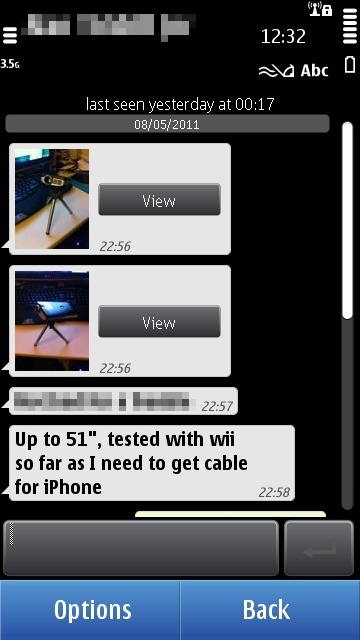
Receiving images in WhatsApp
On other platforms, WhatsApp supports sending contact details as an attachment. I tested the Android version in conjunction with the Symbian version, and found that sending vCard files from Android to Symbian would cause the Symbian device to return a “vCard is not supported in this version of WhatsApp, coming soon” error message.
The last type of content that can be shared is your current location, which is achieved simply, by just tapping the corresponding menu option. Tapping on a received location in Symbian launches Ovi Maps. When I tried sending a location from Symbian to Android, I had the option of viewing it in either the browser or Google Maps.
In the latest version of WhatsApp (2.6.8), group chats are supported. Here you can add multiple contacts to a group, who will all receive messages sent by anyone in the group. This is a great feature, and is a little easier to conduct a three (or more) way conversation than it would be with SMS. It's also a more secure way of sharing your location in an app friendly way with just a few trusted people.
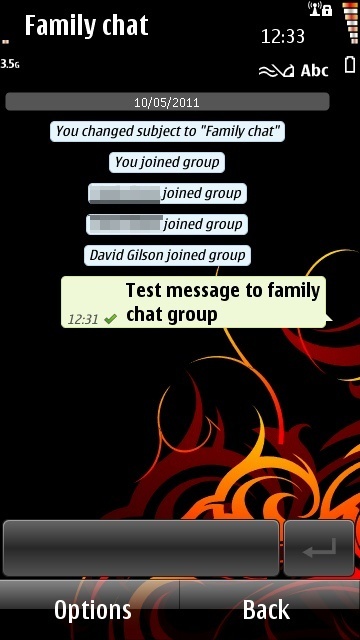
Adding members to a group chat
WhatsApp also provides control for how to connect to the Internet and feedback on your usage. You can set priorities for cellular data and WiFi, and set where received files are saved. What's more you can view a usage table, allowing you to see how much data has been used over both WiFi and your mobile network, along with message counters.
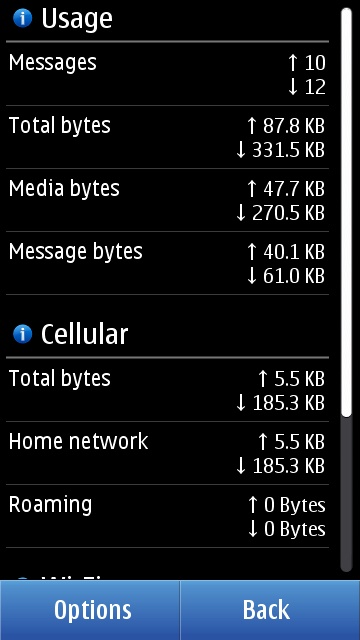
WhatsApp's usage table
WhatsApp is free to use for a year, after which a subscription fee is required. It's rather cheap at $1.99 (USD) per year. However, it's tied to your phone number, not an independent username. This makes me somewhat uncomfortable, but I recognise it won't be an issue to most people. That 1.99 USD is almost nothing compared to the money WhatsApp could save you if you're either a heavy SMS user, or need to send international messages, or both!
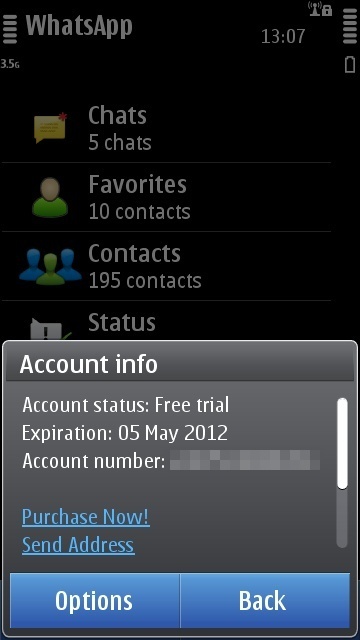
The (well hidden) subscription option for WhatsApp
You can get WhatsApp for free from the Ovi Store, or download the most up to date version from http://www.WhatsApp.com/nokia. WhatsApp does everything it claims, without any bugs that I could find. It won't be for everyone, many readers will likely be happy with their mobile tariff. Then again, using WhatsApp could possibly allow you to think about downgrading your tariff!
Highly recommended.
Please continue this great work and I look forward to more of your awesome blog posts. read
ReplyDelete